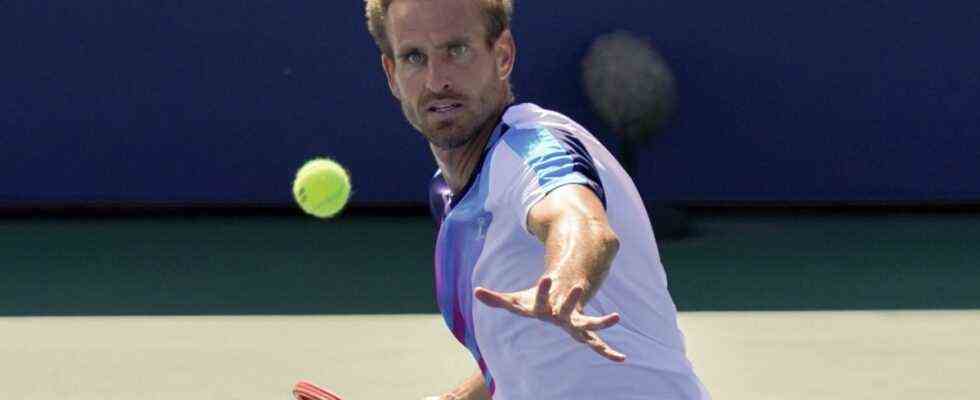Peter Gojowczyk didn’t want to spend too much time in this stuffy place Interview room 3 in the catacombs of Arthur Ashe Stadium. He still had a lot to do that day, although his primary work had long been done – he had defeated Henri Laaksonen (Switzerland) on the Grandstand with 3: 6, 6: 3, 6: 1, 6: 4 and for the first time in reached the round of 16 in a Grand Slam tournament in his life. So now, after the virtual meeting with reporters: second massage, stretching again, eating – but above all he wanted to go to the largest tennis stadium in the world. “Look a few points,” as he said, because the next opponent was playing outside.
This is not, as generally expected, the Greek tennis artist and notorious toilet visitor Stefanos Tsitsipas, but Carlos Alcaraz (Spain), 18 years young, who 6: 3, 4: 6, 7: 6 (2), 0: 6, 7: 6 (5) won. Gojowczyk must have noticed the forehand that Alcaraz swings as smoothly as John Wayne once pulled the revolver. An unpleasant opponent, certainly, but Gojowczyk says of himself: “If it clicks on me, then I’m pretty disgusting to play.”
Can’t believe himself that he has just beaten the big favorite Stefanos Tsitsipas: the Spaniard Carlos Alcaraz.
(Photo: Seth Wenig / dpa)
It’s amazing what Gojowczyk is experiencing in New York. He came two weeks ago as a qualifier. In the first qualifying round he was already one set behind against veteran Lukas Rosol (Czech Republic) (only two winning sets are played), and he won the second in the tie-breaker. He made it into the main field, defeating 23 seeded Ugo Humbert (France) and one round later Dusan Lajovic (Serbia) in five sets – and always lost the first set, like now against Laaksonen.
No trainer, no physiotherapist – Gojowczyk has to find solutions himself
“At the beginning of the game I tried to get into the rallies and not try to win the point straight away. But he put me under pressure with the short slice, then the serve went whistle,” said Gojowczyk afterwards, for the individual interview with the SZ he was in the not-so-stuffy ones Interview room 4 changed. At such moments in a game, tennis players usually look to the coach and hope for encouragement or maybe even a little hint (even if that would be forbidden) how things could go better. Gojowczyk doesn’t have a trainer, physiotherapist or other companion with him, so he always has to find the solution himself – and that’s not that bad at all. “I like to be my own boss,” he says, and he was against Laaksonen too.
He played more aggressively from the second set on, or, as he said: “I prevented his poisonous slice, I went online more often and tried to finish the points faster. That worked out quite well.” There was, of course, one problem at the end of the game: “I knew I was serving for my first round of 16 participation. I just thought: Please, please, please, four first serves – and then not a single one!” He had to fend off two breakballs before he got the first match point: “And then I’ll do an ace – phew!”
Round of 16 sounds a bit like the final
You have changed the prize money structure at the US Open, the winner and the winner will get less this year (but still 2.5 million dollars each), but there is more for the first rounds. Gojowczyk receives $ 265,000 (“That’s a blatant check”) for making it to the round of 16, but he doesn’t want to think about that at first, he still has plans in New York. Third round sounds like an encore on the roller coaster. He’s in the second week and the round of 16 sounds a bit like the final.
He will now play against Alcaraz, maybe even at Arthur Ashe Stadium, the largest tennis arena in the world. Things are different there from other stages; it is louder, bigger, and when serving, for example, the player does not see what he is looking at Court 8 (Opponent, fence, grandstand, sky) sees, but he sees there: opponent, grandstand, box, scoreboard, US flag, roof, floodlights. Many players who played their first game in this monstrous arena then reported that the match was over before they could get used to it.
That shouldn’t happen to Peter Gojowczyk; if he has proven one thing at the US Open: He can adapt quickly and without help to the circumstances.

